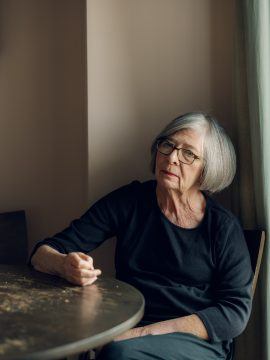Jia Tolentino in The New Yorker:
 Barbara Ehrenreich was born in Butte, Montana, where her family had lived for generations, in 1941. Most of her male ancestors lost fingers working in nearby copper mines. But her father attended night school, then won a scholarship to Carnegie Mellon; the family moved to Pittsburgh and rose into the middle class. Ehrenreich studied physics in college, got a doctorate in cell biology, and, in the late sixties, alongside her husband at the time, John Ehrenreich, she became involved in health-care organizing and antiwar activism.
Barbara Ehrenreich was born in Butte, Montana, where her family had lived for generations, in 1941. Most of her male ancestors lost fingers working in nearby copper mines. But her father attended night school, then won a scholarship to Carnegie Mellon; the family moved to Pittsburgh and rose into the middle class. Ehrenreich studied physics in college, got a doctorate in cell biology, and, in the late sixties, alongside her husband at the time, John Ehrenreich, she became involved in health-care organizing and antiwar activism.
In the decades since, Ehrenreich has tried, as a writer and an activist, to forge a bridge between the working and middle classes. She published her first two books—one on chemistry and one, co-written with her husband, about student protest—in 1969, and started attracting a wide audience in the nineteen-seventies, when she began writing for the influential feminist magazine Ms. She’s now published more than twenty books, including the 2001 bestseller “Nickel and Dimed,” about the daily indignities of low-wage work, and “Natural Causes,” a 2018 polemic about the wellness industry and the illusion of control. Her latest, “Had I Known: Collected Essays,” which brings together work from the past four decades, examines health, the economy, feminism, “bourgeois blunders,” God, science, and joy.
I recently visited Ehrenreich at home, in her fifth-floor condo outside Washington, D.C. Like her, the place was no-nonsense but welcoming. There were magazines on side tables, and shelves piled with books. She had broken her arm the previous weekend—“attacked,” she said, “by a laundry basket,” which she’d tripped over in the dark—and had enlisted a publicist at Twelve Books to pick up sandwiches and drinks for us. She asked over e-mail if I had any dietary preferences or restrictions, and I said that I valued all sandwiches but preferred one without mayonnaise, a choice that later became the subject of discussion. After selecting a turkey sandwich with mustard—Ehrenreich had chicken salad—I sat down with her in a small sunroom overlooking the Potomac River, with a peaceful view of our nation’s stressful capital. Ehrenreich nestled into a wicker love seat, propping her feet up, her right arm balanced gingerly in a sling. Later, as the coronavirus began shutting down the country, we spoke again, over the phone. These two conversations have been combined and edited for length and clarity.
More here.
